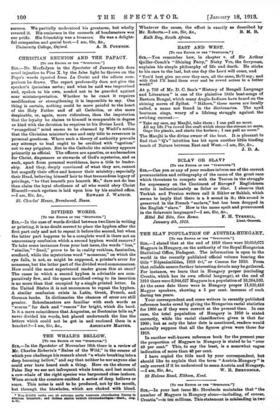DIVIDED WORDS.
[To TUE EDITOR OP THE "SPECTATOR:] SIR,—In the case of words divided between two lines in writing or printing, it is no doubt correct to place the hyphen after the first part only and not to repeat it before the second, but when the latter part happens to be a complete word is there not an unnecessary confusion which a second hyphen would remove ? To take some instances from your last issue, the words "less," "similes," " fined," prove to be in reality reckless, facsimiles, confined, while the mysterious word " monsense," on which the eye falls, is not, as might be supposed, a printer's error for nonsense, but the latter part of the divided word commonsense. How could the most experienced reader guess this at once? The cases in which a second hyphen is advisable are comparatively few, and the space sacrificed owing to its insertion is no more than that occupied by a single printed letter. In the United States it is not uncommon to repeat the hyphen. A similar confusion exists in Latin, Greek, French, and German books. In dictionaries the chances of error are still greater. Schoolmasters are familiar with such words as " scurus " for dark and " ruscus" for bright, which die hard. Is it a mere coincidence that Augustus, as Suetonius tells us,* never divided his words, but placed underneath the line the letters which could not be got in and enclosed them in a
bracket P—I am, Sir, &c., ASSISTANT MASTER.






































 Previous page
Previous page